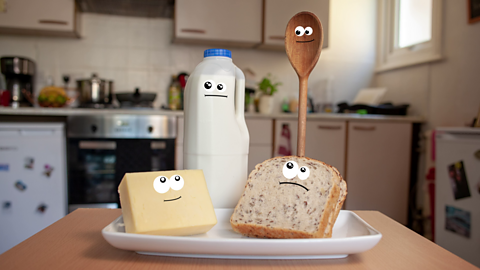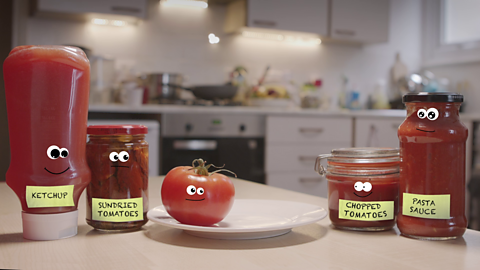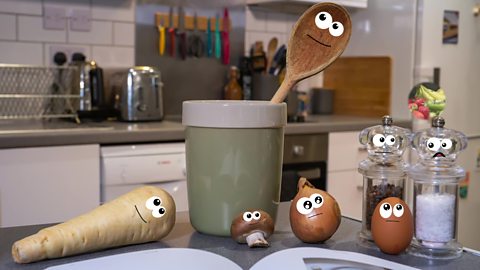Do we always have the same food needs?
What we need from food changes as we grow. Babies, children and teenagers have particular food needs so they can grow, learn and be active.
In this article you can learn about:
- what young people should eat at different life stages
- the vitamins and nutrients we get from some foods
This resource is suitable for Health and Wellbeing for primary school learners.
Video - Food at different stages
In this video, we visit a family kitchen to find out how different foods can provide nutrition to young people at different stages in their development.
At each stage of our life we have different nutritional needs.
Babies (0-2 years old)
- Babies have milk from birth then slowly learn how to eat foods from six months old.
- At first, the food they eat is blended or mashed up as they do not yet have enough teeth to chew with.
- Babies should be given a wide variety of food, this way they learn lots of different tastes.
- They should only eat a very tiny amount of salt.
Children (3-12 years old)
- Children have a full set of teeth and should be eating a wide variety of foods.
- They need carbohydrates for energy and should eat foods that are low in salt and sugar.
- Children should also drink plenty of water every day.
- All of these things will help power children through their school work and activities.
Teenagers (13-19 years old)
- Teenagers need to eat a well-balanced diet.
- A teenager's body is preparing to become an adult. They need to give their body good fuel for all that growing and changing.
- It's important for teenagers to get into healthy eating habits that they can carry through their adult lives.
- Their meals should include foods from all five food groups, aiming for targets like five portions of fruit and vegetables a day.
- Teenagers should also drink six to eight cups of water a day.
At all stages of our growth we need food that contains lots of nutrients and energy.

Image caption, Babies (0-2 years old)
Babies have milk from birth and then slowly learn how to eat foods from six months old. At first, the food they eat is blended or mashed up.
Image caption, Children (3-12 years old)
Children have a full set of teeth and should be eating a wide variety of foods. They should also drink plenty of water every day.
Image caption, Teenagers (13-19 years old)
Teenagers need lots of energy for their growing bodies. They should eat a well-balanced diet, which will help set up good eating habits for their adult lives..
1 of 3
What we get from specific foods
Babies
- Meat, fish and eggs contain protein and iron which babies need to grow and develop. They can also get protein from beans and lentils. Some breakfast cereals, dark green vegetables and beans contain iron.
- Fruit and vegetables provide lots of vitamins like vitamin A and vitamin C to help babies fight off germs. Vitamin A is good for skin and eyes. Vitamin C helps you absorb iron from other foods.
Children
- Dairy foods like milk, cheese and yoghurt contain calcium which helps bones grow strong and healthy.
- Brown bread, some cereals and vegetables are full of fibre which helps us digest food.
Teenagers
- Foods rich in potassium such as spinach and sweet potatoes are great for a healthy heart and blood pressure.
- Nuts and avocados are full of magnesium which helps with growing pains. This is very useful at this life stage as it has rapid growth spurts (when our body grows quickly).
Interesting words about nutrition
- digest ā Breaking down food in our bodies so that we can absorb its nutrients.
- diet ā What we eat and drink.
- nutrition ā The contents of food and how it affects our bodies.
- proteins ā Food which build healthy muscles and allow our bodies to grow and repair. This includes fish, meat, beans, pulses and eggs.
- carbohydrates ā Food which keeps our energy levels up like rice, bread, pasta and potatoes.
- fats ā Food which acts as an energy store such as butter, margarine and olive oil.
- fibre ā Food which helps food move through our bodies, like brown bread and broccoli.
- vitamins and minerals ā These can be found in a wide variety of foods. They help all areas of body work correctly and stay healthy. Potassium, magnesium and calcium are all examples of minerals. A, C, D and B6 are all examples of vitamins.
- baby food ā Any food that is smooth and easily eaten by babies.
Test your knowledge
Try this quiz all about food at different life stages.
Challenge
Can you draw a healthy dinner for a baby, child or teenager? Can you include a food that contains calcium?
More on Food and health
Find out more by working through a topic
- count6 of 10

- count7 of 10

- count8 of 10

- count9 of 10
